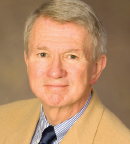
Robert B. Livingston, MD
Over the past couple of decades, chemoradiation for several cancers, such as lung and breast, has advanced in efficacy and side-effect tolerance, prolonging survival and quality of life for patients. One of the pioneers in chemoradiation, Robert B. Livingston, MD, died on September 8, 2016.
Dr. Livingston completed his medical internship at Parkland Hospital, Southwestern Medical School in Dallas and did his medical residency at the University of Oklahoma College of Medicine. He performed his oncology fellowship from 1971 to 1973 at the University of Texas (UT) System Cancer Center. After that, Dr. Livingston continued his career in oncology, research, and teaching at a number of esteemed institutions. At the time of his death, Dr. Livingston was Professor of Medicine and Hematologic Oncology at the University of Arizona College of Medicine, specializing in breast cancer.
I met Bob Livingston in July 1974…. I believe he was an assistant professor in Emil J Freireich’s Department of Developmental Therapeutics, and was very bright and outspoken. I remember frequent and vocal discussions between him and Dr. Freireich.— Gabriel N. Hortobagyi, MD, FACP
Tweet this quote
Dr. Livingston had more than 30 years of international clinical research experience in both breast and lung cancers. He formerly chaired the Breast Cancer Committee of SWOG and was one of the country’s strongest advocates and experts on clinical trials and clinical research.
Dr. Livingston introduced the use of concurrent chemotherapy and radiation for limited small cell lung cancer, which produced acceptable toxicity and results superior to those with the use of either therapy alone, in a scientific context where they had been previously given alone or administered sequentially.
Prior to his death, Dr. Livingston’s research interest was to assist Pavani Chalasani, MD, in the development of a promising new methodology for the definition of “BRCAness” in breast cancer, which they believe may have practical application to treatment selection for specfic biologic subgroups, based on criteria that involve the loss of homologous recombinant DNA repair as an exploitable therapeutic target.
Tribute From a Colleague
Hearing of Dr. Livingston’s passing, colleagues from across the nation offered tributes. Breast cancer specialist Gabriel N. Hortobagyi, MD, FACP, told The ASCO Post: “I met Bob Livingston in July 1974, when I started my fellowship at MD Anderson. I believe he was an assistant professor at that time, in Emil J Freireich’s Department of Developmental Therapeutics, and was very bright and outspoken. I remember frequent and vocal discussions between him and Dr. Freireich. He married Shirley (one of our immunotherapy nurses at MD Anderson when I arrived) in 1974 or 1975, if I recall correctly. He left within a few years and joined UT San Antonio.”
Dr. Hortobagyi continued: “From there, he moved to the Cleveland Clinic as Division Chief and a few years later moved to the University of Washington, where he stayed until about 5 or 6 years ago. I took over for him as Breast Committee Chair in 2007, but previous to that, I understand he was Lung Committee Chair. His background was classical chemotherapy and clinical pharmacology. He trained or spent time at the National Cancer Institute and worked closely with Stephen K. Carter, MD, with whom he published a couple of books on chemotherapy. He had a dry sense of humor, was self-assured, and rather private.”
Dr. Livingston was an honored member of ASCO since 1975. He served the Society as Chair of the Nominating and Bylaws Committee. ■

